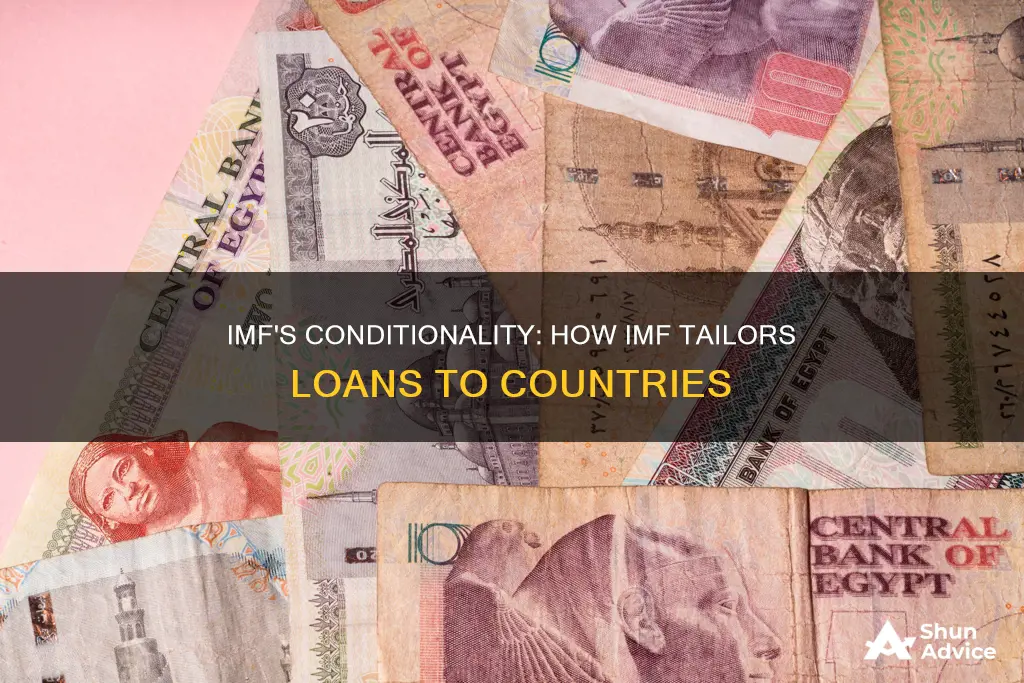
The International Monetary Fund (IMF) is a major financial agency of the United Nations that provides loans to countries in need. While the IMF claims that poverty reduction is one of its objectives, studies have shown that IMF borrower countries experience higher rates of poverty due to the structural conditions imposed on their loans. These conditions, known as conditionality, require countries to implement specific policy reforms to correct their macroeconomic imbalances and ensure repayment. The impact of these conditions has been controversial, with some arguing that they have contributed to increased unemployment, lowered government revenue, and prolonged recessions. However, the IMF maintains that its lending provides countries with the necessary breathing room to adjust their policies and promote sustainable growth. This topic explores the complex relationship between IMF loans and the economic realities of borrowing countries, highlighting the potential benefits and drawbacks of IMF involvement in global financial crises.
What You'll Learn

The IMF's impact on poverty
The International Monetary Fund (IMF) claims that poverty reduction is one of its objectives. However, some studies show that IMF borrower countries experience higher rates of poverty. The IMF provides financial and other support to low-income countries (LICs) through its surveillance program, which continuously monitors member countries' economic and financial policies. The IMF also provides policy advice and capacity development support to member countries.
The IMF's lending programs have conditions that countries must agree to in order to receive financial assistance. These conditions typically involve policy adjustments aimed at solving balance of payments problems and safeguarding IMF resources. While the IMF has become more flexible in its approach to structural reforms, some argue that the structural conditions required by the IMF contribute to trapping more people in the poverty cycle by raising unemployment, lowering government revenue, increasing the costs of basic services, and restructuring tax collection, pensions, and social security programs.
On the other hand, loan arrangements promoting stabilisation reforms have been found to have less impact on the poor as borrower states have more discretion over their macroeconomic targets. The IMF has responded to crises such as the COVID-19 pandemic by providing unprecedented financial assistance to help protect the most vulnerable and set the stage for economic recovery. For example, the IMF provided debt service relief of about $976 million to 31 member countries to fight the COVID-19 pandemic.
The IMF has also approved policy reforms and funding packages to support low-income countries in a sustainable manner. These reforms include a long-term self-sustained annual lending envelope of about $3.6 billion and a framework to generate about $8 billion in PRGT subsidy resources. The IMF's Executive Board conducts periodic program reviews to assess whether adjustments are needed in light of new developments.
Hyundai Warranty: Loaner Coverage and Your Rights
You may want to see also

IMF's role in economic recovery
The International Monetary Fund (IMF) is a major financial agency of the United Nations, with 191 member countries. It is regarded as the global lender of last resort to national governments and a leading supporter of exchange-rate stability. The IMF was established in July 1944 at the Bretton Woods Conference, with the goal of reconstructing the international monetary system after World War II.
The IMF's role has evolved over time, initially focusing on facilitating fixed exchange rates across the developed world. However, after 1971, its role shifted to examining the economic policies of countries with IMF loan agreements to determine the causes of a shortage of capital. The IMF also began researching the types of government policies that would ensure economic recovery. The organisation's primary objective is to foster global monetary cooperation, secure financial stability, facilitate international trade, promote high employment, enable sustainable economic growth, and reduce poverty worldwide.
The IMF provides financial assistance to countries facing economic crises, such as balance of payment problems, financial crises, and fiscal crises. For instance, during the COVID-19 pandemic, the IMF offered unprecedented financial support to help vulnerable countries and set the stage for economic recovery. The IMF's lending programs are tailored to countries' specific needs and circumstances, giving them breathing room to adjust policies and work towards stable economies and sustainable growth.
The IMF also plays a role in preventing financial crises from spreading and threatening the global financial system. It does so by promoting and implementing policies that reduce the frequency of crises, especially in vulnerable middle-income countries. The IMF provides short-term financial support, maintains currency stability, and monitors global economic trends, offering policy advice to its members.
Additionally, the IMF has become more flexible in engaging with countries on structural reforms. It periodically reviews its programs and the performance of its members, assessing whether adjustments are needed. The IMF's conditionality policies ensure that borrowing countries implement strong and effective economic policies to overcome their financial challenges. While there are criticisms of the IMF's structural conditions leading to increased poverty, the organisation claims that poverty reduction is one of its objectives, especially for low-income countries.
In summary, the IMF plays a crucial role in economic recovery by providing financial support, promoting stability, offering policy advice, and fostering sustainable growth and cooperation among its member countries.
Borrowing eBooks: Howard County Library's Lending Services
You may want to see also

IMF loan conditions
The International Monetary Fund (IMF) is a major financial agency of the United Nations, funded by 191 member countries. It is regarded as the global lender of last resort to national governments and a leading supporter of exchange-rate stability. Its stated mission is to foster global monetary cooperation, secure financial stability, facilitate international trade, promote high employment and sustainable economic growth, and reduce poverty worldwide.
The IMF offers various types of loans that are tailored to countries' different needs and circumstances. When a country borrows from the IMF, the government agrees to adjust its economic policies to address the issues that led it to seek financial assistance. These policy adjustments are conditions for IMF loans and are intended to ensure that the country adopts robust and effective policies. The overarching goal is to restore or maintain balance of payments viability and macroeconomic stability while setting the stage for sustained, high-quality growth.
IMF conditionality is a set of policies or conditions that the IMF requires in exchange for financial resources. These conditions are designed to ensure that the borrowing country will be able to repay the IMF and that the country will not attempt to solve its balance-of-payment problems in a way that negatively impacts the international economy. The IMF does not require collateral from countries for loans, but it does require the government seeking assistance to correct its macroeconomic imbalances through policy reforms.
The IMF has been criticised for the impact of its loan conditions on poverty in developing countries. Some studies show that IMF borrower countries experience higher rates of poverty, with loan arrangements containing structural reforms contributing to more people getting trapped in the poverty cycle. These reforms tend to raise unemployment, lower government revenue, increase the costs of basic services, and lead to restructuring tax collection, pensions, and social security programs. However, the IMF has become more flexible over time, allowing borrowers greater discretion, particularly with stabilisation policies.
Homestyle Loan: Landscaping Covered?
You may want to see also

IMF's influence on a country's policies
The International Monetary Fund (IMF) is a global organisation that works to achieve sustainable growth and prosperity for its 191 member countries. It does this by supporting economic policies that promote financial stability and monetary cooperation, which are essential for increasing productivity, creating jobs, and improving economic well-being. The IMF also provides loans and other financial aid to its members, along with technical assistance and training to help governments implement sound economic policies.
The IMF's influence in the global economy has steadily increased as it has accumulated more members. Its governance structure, however, disproportionately favours wealthier nations, particularly the United States, which has the greatest number of votes and wields the most influence. The clout of member states is roughly proportional to its contribution to IMF finances. Domestic politics often come into play, with politicians in developing countries using conditionality to gain leverage over the opposition and influence policy.
When a country borrows from the IMF, the government agrees to adjust its economic policies to address the issues that led it to seek financial assistance. These policy adjustments are conditions for IMF loans and are intended to ensure that the country adopts robust and effective policies. The IMF provides policy advice and capacity development to member countries, and its lending gives countries the flexibility to adjust policies in a structured manner, paving the way for a stable economy and sustainable growth.
The IMF has been criticised for its handling of failing national policies, with some arguing that it intervenes too much or too little and that its policies can create a moral hazard. Critics also argue that the IMF's initial policies, which were based on theory, lacked economic rationale and were misinformed when applied to countries with diverse economic circumstances. Additionally, while the IMF claims that poverty reduction is one of its objectives, studies show that IMF borrower countries experience higher rates of poverty due to the prescribed structural reforms, which tend to raise unemployment, lower government revenue, and increase the costs of basic services.
HUD Construction Loans: What You Need to Know
You may want to see also

IMF's response to crises
The International Monetary Fund (IMF) plays a crucial role in stabilizing economies and restoring market confidence during times of crisis. Its response to economic crises involves providing financial assistance, policy advice, and coordination with other stakeholders to ensure a cohesive strategy.
One notable example of IMF's crisis response is Black Wednesday in 1992, when the British pound sterling plummeted, triggering a significant financial crisis. The IMF's swift actions during this event included providing emergency loans to the United Kingdom, offering policy advice, and collaborating with various entities to stabilize exchange rates and restore confidence in the international financial system. This episode highlighted the importance of timely intervention and coordination in managing currency crises and left a lasting impact on the IMF's approach to crisis prevention and resolution.
The COVID-19 pandemic is another instance where the IMF responded with unprecedented financial assistance to help countries protect vulnerable populations and lay the groundwork for economic recovery. The IMF's lending toolkit offers various loan types tailored to countries' specific needs, including zero-interest loans for low-income nations. These loans provide countries with the flexibility to adjust policies and strengthen their economies while addressing challenges like capital outflows or export price fluctuations.
However, there is criticism and ongoing debate about the impact of IMF loan conditions on poverty in developing nations. Some studies suggest that IMF loan arrangements with structural reforms contribute to higher unemployment, reduced government revenue, and increased costs of basic services, ultimately trapping more people in poverty. In contrast, stabilization reforms appear to have less negative impact on the poor, as borrower states have more discretion over their macroeconomic targets.
In response to such criticisms, the IMF has shown increased flexibility in its engagement with countries on structural reforms. The IMF's 2018 Review of Program Design and Conditionality reflected its evolving approach to conditionality, demonstrating a willingness to adapt its strategies over time.
HR Block's Refund Anticipation Loans: What's the Deal?
You may want to see also
Frequently asked questions
The International Monetary Fund (IMF) is a major financial agency of the United Nations, an international financial institution funded by 191 member countries, with headquarters in Washington, D.C. It is regarded as the global lender of last resort to national governments, and a leading supporter of exchange-rate stability.
The IMF requires collateral from countries for loans but also requires the government seeking assistance to correct its macroeconomic imbalances in the form of policy reform. These conditions are known as "conditionality" and are a set of policies or conditions that the IMF requires in exchange for financial resources. The IMF does not provide loans without these conditions being met.
Studies have shown that IMF borrower countries experience higher rates of poverty. This is because IMF loan arrangements containing structural reforms contribute to more people getting trapped in the poverty cycle, as the reforms involve deep and comprehensive changes that tend to raise unemployment, lower government revenue, increase costs of basic services, and restructure tax collection, pensions, and social security programs.







